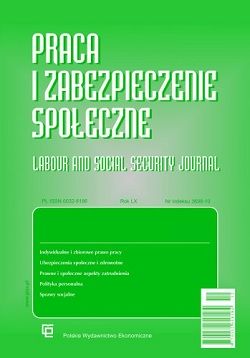
- Draft new law on collective disputes. Critical analysis
The act on resolving collective disputes adopted in the early 1990s no longer responds to the challenges of the labor market. Therefore, the need to change the regulations has been pointed out by both social partners, representatives of science and mediators for many years. However, the attempts to amend the regulations so far, including in particular the work of the Labor Law Codification Commissions in the years 2002-2007 and 2016-2018, have not been successful. Therefore, with the main aim of preserving social peace, the government proposed a new law on collective disputes. And it is the assessment of the most important provisions of this act that is the subject of this article. - Social morality: theoretical approach and practical significance
The availability of social benefits is determined by legal regulations in force in a given country. The actual scope of using these benefits depends, however, on cultural conditions, including, above all, on the prevailing moral norms. While some individuals (individuals, households) abuse social benefits, others - on the contrary - do not take advantage of benefits despite having appropriate authorizations to do so. Such an individual attitude to the solutions offered by the welfare state has been referred to as "social morality". This article attempts to conceptualize this concept. Its essence and practical significance for the functioning of the social security system were presented. In addition, both "deviations" from the optimal use of benefits were discussed, i.e. excessive use (so-called social abuse) and insufficient use (so-called social indifference). - The EU concept of reasonable accommodation for people with disabilities
The aim of the article is to analyze the currently applicable EU standards in the field of reasonable accommodation, including specifying their nature, scope and types. Research in this area was based on two hypotheses. Firstly, both the legal provisions and the jurisprudence of the Court of Justice of the EU recognize that the concept of reasonable accommodation should be broad, yet flexible, and is an important instrument to ensure the de facto equality of disabled workers. Secondly, despite the existence of EU legal regulations relating to reasonable accommodation, employers do not always fulfill the obligation to introduce them in such a way as to take into account the individual needs of people with disabilities. As a result, the article first presents the EU legal framework for the obligation of reasonable accommodation, taking into account the sources of primary and secondary law and their mutual relations. Then, the most important decisions of the Court of Justice of the EU regarding the title concept, including those issued in 2021-2022, were analyzed. The last part of the article focuses on the assessment of the legal nature and scope of reasonable accommodation, and also indicates their most typical types and examples. - Industrial revolution 4.0, labor law and procedural labor law 4.0
The article aims to analyze the correlation between the fourth industrial revolution, labor law and procedural labor law 4.0. The authors present the historiography of labor and indicate how the revolution causes real and significant structural changes, both in the area of substantive law and procedural labor law. The deductive method in the qualitative perspective and the results of research on the subject literature were used to develop this article. - Selected legal problems of the protection of personal data of participants in internal anti-mobbing proceedings
The article deals with the issue of the protection of personal data of participants in internal anti-mobbing proceedings, including primarily data obtained in a secondary manner. The legal analysis covered in particular the employer's information obligation towards participants in in-house anti-mobbing proceedings under Art. 14 of Regulation (EU) 2016/679 of the European Parliament and of the Council of 27 April 2016 on the protection of natural persons with regard to the processing of personal data and on the free movement of such data, and repealing Directive 95/46/EC. The author also interprets the provision of “Art. 15 of the GDPR, which guarantees the data subject the right to access data about him. The analysis regarding the protection of participants in internal anti-mobbing proceedings was also carried out in the context of the planned changes in the protection of whistleblowers. The conclusion contains the key de lege lata and de lege ferenda conclusions resulting from the considerations.
Praca i Zabezpieczenie Społeczne (Work and Social Security) - the whole list






